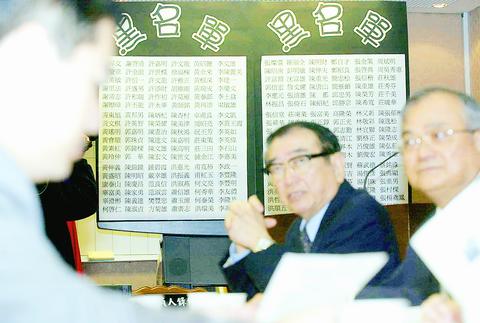Former political dissidents blacklisted by Taiwan's authorities when the country was under martial law joined lawmakers yesterday to urge the government to disclose files pertaining to the formation of the persona non grata policy in Taiwan's history.
The policy which mainly targeted supporters of Taiwan independence, was formulated during the martial law period. Those Taiwanese labeled by the policy were forbidden from returning to their homeland.

PHOTO: CHIANG YING-YING, TAIPEI TIMES
"The government should bring these files into the light to allow victims of the blacklist to enjoy the right to go over these files about themselves," said DPP lawmaker Hsiao Bi-khim (
"They have every right to clearly understand why they were accused by the authorities and how they were monitored," Hsiao said.
Dozens of victims of the policy, voiced similar yearnings.
"I hope that investigations into the formulation of the blacklist in the past under the KMT-led government can allow us to understand the truth," said Lo Yi-shih (
Organizers of the hearing also released countless names blacklisted by the KMT government in the past, many of which have turned the table to emerge as key players in the ruling DPP government.
Lo Fu-chen (
Lee Ying-yuan (
In 1990 Lee returned to Taiwan through illegal channels as part of WUFI's plan to move its headquarters back to Taiwan, and began a 14-month hide-and-seek game with intelligence agents before he was arrested on charges of sedition.
Former dissidents at the public hearing also targeted incumbent Taipei city mayor Ma Ying-jeou (
"Although he has denied taking photos of demonstrators in a street protest back in 1978, I witnessed it myself," said Chang Chi-tien (
Chang at the time was pursuing his degree in medicine, while Ma was studying law in Harvard.
Ma has always denied any accusation about to his alleged role as a KMT spy during his studies overseas.
Campaigners for opening records of the blacklist believe that the proof of his involvement, in the guise of written reports, lies in the files.

The CIA has a message for Chinese government officials worried about their place in Chinese President Xi Jinping’s (習近平) government: Come work with us. The agency released two Mandarin-language videos on social media on Thursday inviting disgruntled officials to contact the CIA. The recruitment videos posted on YouTube and X racked up more than 5 million views combined in their first day. The outreach comes as CIA Director John Ratcliffe has vowed to boost the agency’s use of intelligence from human sources and its focus on China, which has recently targeted US officials with its own espionage operations. The videos are “aimed at

STEADFAST FRIEND: The bills encourage increased Taiwan-US engagement and address China’s distortion of UN Resolution 2758 to isolate Taiwan internationally The Presidential Office yesterday thanked the US House of Representatives for unanimously passing two Taiwan-related bills highlighting its solid support for Taiwan’s democracy and global participation, and for deepening bilateral relations. One of the bills, the Taiwan Assurance Implementation Act, requires the US Department of State to periodically review its guidelines for engagement with Taiwan, and report to the US Congress on the guidelines and plans to lift self-imposed limitations on US-Taiwan engagement. The other bill is the Taiwan International Solidarity Act, which clarifies that UN Resolution 2758 does not address the issue of the representation of Taiwan or its people in

US Indo-Pacific Commander Admiral Samuel Paparo on Friday expressed concern over the rate at which China is diversifying its military exercises, the Financial Times (FT) reported on Saturday. “The rates of change on the depth and breadth of their exercises is the one non-linear effect that I’ve seen in the last year that wakes me up at night or keeps me up at night,” Paparo was quoted by FT as saying while attending the annual Sedona Forum at the McCain Institute in Arizona. Paparo also expressed concern over the speed with which China was expanding its military. While the US

SHIFT: Taiwan’s better-than-expected first-quarter GDP and signs of weakness in the US have driven global capital back to emerging markets, the central bank head said The central bank yesterday blamed market speculation for the steep rise in the local currency, and urged exporters and financial institutions to stay calm and stop panic sell-offs to avoid hurting their own profitability. The nation’s top monetary policymaker said that it would step in, if necessary, to maintain order and stability in the foreign exchange market. The remarks came as the NT dollar yesterday closed up NT$0.919 to NT$30.145 against the US dollar in Taipei trading, after rising as high as NT$29.59 in intraday trading. The local currency has surged 5.85 percent against the greenback over the past two sessions, central